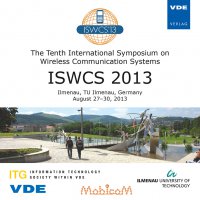Preamble Design for Channel Estimation in OFDM/OQAM Cooperative Systems
Conference: ISWCS 2013 - The Tenth International Symposium on Wireless Communication Systems
08/27/2013 - 08/30/2013 at Ilmenau, Deutschland
Proceedings: ISWCS 2013
Pages: 5Language: englishTyp: PDF
Personal VDE Members are entitled to a 10% discount on this title
Authors:
Mavrokefalidis, Christos (Patras University Campus, Patras, Greece)
Kofidis, Eleftherios (Dept. of Statistics and Insurance Science, University of Piraeus, Piraeus, Greece)
Rontogiannis, Athanasios (Institute for Astronomy, Astrophysics, Space Applications and Remote Sensing, National Observatory of Athens, Athens, Greece)
Theodoridis, Sergios (Dept. of Informatics and Telecommunications, University of Athens, Athens, Greece)
Abstract:
Preamble design for LS channel estimation in OFDM/OQAM cooperative systems is investigated in this paper. A simple but important setup is considered, consisting of a pair of single-antenna terminals (source and destination) assisted in their communication by an AF relay and following a well-established two-phase transmission protocol. The so-called sparse preamble case (i.e., pilot tones surrounded by nulls) was recently addressed and the optimal design – in the sense of minimum MSE subject to transmit energy constraints – was shown to coincide with the one for CP-OFDM, thus resulting in no performance gains from the adoption of OFDM/OQAM. In order to complete this study and exhibit the possibilities of OFDM/OQAM to outperform CPOFDM, the so-called full preamble design (i.e., with all tones carrying pilot symbols) is addressed in this paper. The results are in line with the corresponding design for single-link systems, where the interference among pilots is positively exploited to provide significant performance gains over CP-OFDM. As a byproduct, the solution for cooperative CP-OFDM is also given, through its connection to OFDM/OQAM. The presented simulation results corroborate the analysis, demonstrating superior performance over CP-OFDM for both mildly and highly frequency selective channels and at practical SNR values.


